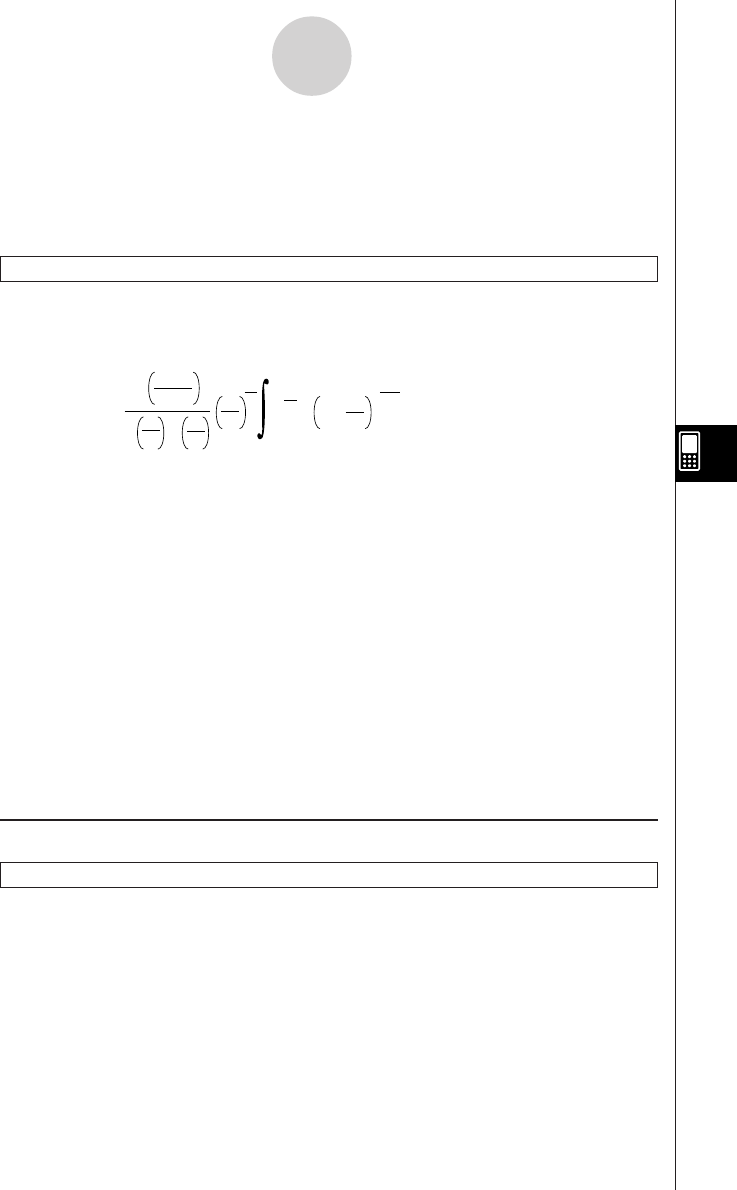User Manual
Table Of Contents
- Getting Ready
- Contents
- About This User’s Guide
- Chapter 1 Getting Acquainted
- Chapter 2 Using the Main Application
- 2-1 Main Application Overview
- 2-2 Basic Calculations
- 2-3 Using the Calculation History
- 2-4 Function Calculations
- 2-5 List Calculations
- 2-6 Matrix and Vector Calculations
- 2-7 Using the Action Menu
- 2-8 Using the Interactive Menu
- 2-9 Using the Main Application in Combination with Other Applications
- 2-10 Using Verify
- Chapter 3 Using the Graph & Table Application
- Chapter 4 Using the Conics Application
- Chapter 5 Using the 3D Graph Application
- Chapter 6 Using the Sequence Application
- Chapter 7 Using the Statistics Application
- 7-1 Statistics Application Overview
- 7-2 Using List Editor
- 7-3 Before Trying to Draw a Statistical Graph
- 7-4 Graphing Single-Variable Statistical Data
- 7-5 Graphing Paired-Variable Statistical Data
- 7-6 Using the Statistical Graph Window Toolbar
- 7-7 Performing Statistical Calculations
- 7-8 Test, Confidence Interval, and Distribution Calculations
- 7-9 Tests
- 7-10 Confidence Intervals
- 7-11 Distribution
- 7-12 Statistical System Variables
- Chapter 8 Using the Geometry Application
- Chapter 9 Using the Numeric Solver Application
- Chapter 10 Using the eActivity Application
- Chapter 11 Using the Presentation Application
- Chapter 12 Using the Program Application
- Chapter 13 Using the Spreadsheet Application
- Chapter 14 Using the Setup Menu
- Chapter 15 Configuring System Settings
- 15-1 System Setting Overview
- 15-2 Managing Memory Usage
- 15-3 Using the Reset Dialog Box
- 15-4 Initializing Your ClassPad
- 15-5 Adjusting Display Contrast
- 15-6 Configuring Power Properties
- 15-7 Specifying the Display Language
- 15-8 Specifying the Font Set
- 15-9 Specifying the Alphabetic Keyboard Arrangement
- 15-10 Optimizing “Flash ROM”
- 15-11 Specifying the Ending Screen Image
- 15-12 Adjusting Touch Panel Alignment
- 15-13 Viewing Version Information
- Chapter 16 Performing Data Communication
- Appendix

20050501
7-11-7
Distribution
Input Example:
FPD 1.7,2,3
Calculation Result Output
p : F probability density
F Distribution Probability
Command: FCD䡺
Description: This command calculates the probability of F distribution data falling between
a and b.
p =
Γ
n
2
dx
x
d
n
n
2
–1
2
n
Γ
2
n + d
Γ
2
d
d
n
.
x
1 +
n + d
2
–
a
b
a : lower boundary (Lower)
b : upper boundary (Upper)
Command Syntax
Lower value, Upper value, n:df value, d:df value
Definition of Terms
Lower : lower boundary
Upper : upper boundary
n:df : degrees of freedom of numerator (positive integer)
d:df : degrees of freedom of denominator (positive integer)
Input Example:
FCD 0.76,3,2,3
Calculation Result Output
p : F distribution probability
k Binomial Distribution
Binomial Probability
Command: BinomialPD䡺
Description: This command calculates the probability that a random variable that follows a
binomial distribution will be a given x value. For example, it determines the
probability of x successes when the probability of success p-trial is performed
n times.
f (x) =
n
C
x
p
x
(1–p)
n – x
(x = 0, 1, ·······, n) p : probability of success
(0 < p < 1)
n : number of trials










